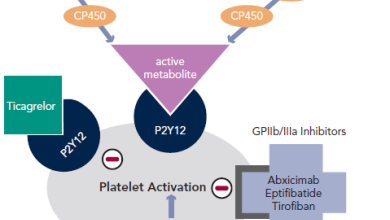Search results
PROMOTED
Author(s):
Nicolas M Van Mieghem
,
Kendra J Grubb
,
David Hildick-Smith
,
et al
Start date:
Mar 26, 2024
Author(s):
Benjamin Galper
,
Roxana Mehran
Added:
3 years ago
Acute coronary syndromes (ACS) result from unstable coronary artery plaques that rupture and can lead to coronary ischaemia, unstable angina and myocardial infarction. The treatment goals in ACS focus on reducing ischaemia, preventing further progression of thrombotic plaque by disturbing the milieu of thrombosis and platelet aggregation taking place within the coronary artery and, in the case of…
View more
Author(s):
Timm Bauer
,
Christian Hamm
Added:
3 years ago
Introduction
Antiplatelet therapy is a cornerstone in coronary artery disease (CAD) management. Acetylsalicyclic acid (ASA) has been known for many decades to have antithrombotic efficacy. Already in the 1980’s, the ISIS-2 study demonstrated that ASA reduces mortality in acute myocardial infarction (AMI) by 23 %.1 ASA leads to irreversible inactivation of cyclooxygenase 1 and thereby blocks the…
View more
Prof. Johanne Silvain
Job title: Prof. Johanne Silvain is professor of medicine at the Pierre and Marie Curie University in Paris, France.
Author
Author(s):
Sri Raveen Kandan
,
Thomas W Johnson
Added:
3 years ago
Antiplatelet Therapy
Current guidelines support the early administration of oral antiplatelet agents upstream of angiographic assessment and intervention.1 Aspirin is commonly given by the first medical contact and additional oral antiplatelet drugs are administered on arrival in hospital (see Figure 1).
Aspirin
The efficacy of aspirin in acute ST-segment elevation myocardial infarction (STEMI)…
View more
Robert F Storey
Job title: Professor and Honorary Consultant in Cardiology
Author
Foreword
Author(s):
Simon Kennon
Added:
3 years ago
Article
Foreword
Author(s):
Simon Kennon
Added:
3 years ago
Article
Foreword
Author(s):
Simon Kennon
Added:
3 years ago
Article
Author(s):
Jean-Pierre Bassand
Added:
3 years ago
Anticoagulants and antiplatelet therapies, and revascularisation/ reperfusion with percutaneous coronary interventions (PCIs) or surgery are the mainstay of modern treatment of acute coronary syndromes (ACS) with and without ST-segment elevation. In addition, depending on the clinical presentation, thrombolytic therapy may be necessary in patients with ST-elevation myocardial infarction (MI) who…
View more













